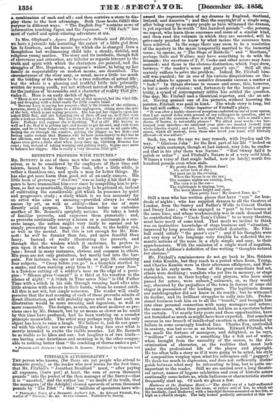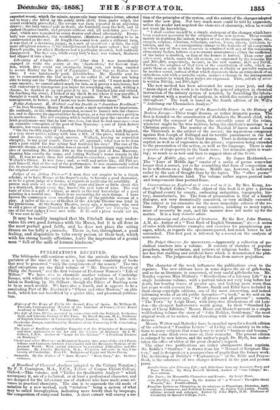PITZBALL'S AUTOBIOGRAPHY.*
Tun person who knows, (for there are yet people who attend to dramatic gossip,) or the reader who now learns for the first time, that Mr. Fitzball's "Jonathan Bradford" must, "after paying all expenses, [have put] at least, the sum of seven thousand pounds" into the pocket of the then manager of the Surrey—that it is "asserted," and the author has "no doubt of its truth, that the managers [of the Adelphi] cleared upwards of seven thousand pounds by The Pilot' " ; that "millions of spectators have wit- • Thirty-five Years of a Dramatic Author's Life. By Edward Fitzball, Esq. Author of " Nitocris," &C. &C. In two volumes. Published by Newby. nessed the 'representation of my dramas in England, Scotland, Ireland, snd. America " ; and that the copyright of a single song, after being sung byes many-people as have witnessed the dramas, is yet reported to be.worth five hundred pounds "—the persons, we repeat, who learn-these successes and more of a similar kind, and then.read the volumes in which they are recorded, will be grievously puzzled to know by what means the successes have been achieved. In the songs there may seem to be a resolution of the mystery in the music temporarily married to the immortal verse ; in operas as " The.Siege of Rochelle" and " Maritana," perhaps Balfe and Wallace may have something to do with the triumph ; the crerticms of T; ,P.•Gooke and other actors may have assisted ; sad there is the obvious distinction, which' Pope drew, between-" the reader's sense and gazer's eye." Still all this scarcely suffices to 4.olve the problem. Indeed Mr, Fitzball him- self was puzzled ; for in one of his various disquisitions on the- atrical affairs he appears to consider dramatie success a matter of "luck." In things ebvious to reason and sense, this, however, is but a mode of evasion; and, fortunately for the brains of pos- terity, a synod of contemporary critics has settled the question. One day, Mn.- Fitzball met a theatrical reporter, and eke an art- ist. Having praised one of his pictures, without knowing the painter, Eitaball was paid in-, kind. The whole story is long, but the tail will suffice. Critic logteitair of Fitzball's plays. • "it was after a highly-deserved reception conferred on one of your operas, that I sat myself down with several of my colleagues in question, and we mutually put the question—How is it that this fellow, with so small a mo- dicum of brains, do invaria'bly.pleases ? We sifted your words—we bur- lesqued your speeches—we analysed your plot—we mooted [voted] your whole libretto stupid ; and yet, lastly, came to the discovery of your great secret, which all present, even those who loved you least, still liberally
allowed—it was nature." -
Such, too, was the case we may remark, with Dryden and Ot- way. . Glorious John" for the first part of his life "looked on Otway with contempt, though at last indeed, very late, he oonfes- sed that in his play there was Nature." " But' Otway faiPd to polish or refine" ; and Fitzball's Natare is of a very mild kind. Witness a verse of .that single ballad, now (or lately) worth five hundred pounds even when stale. " Ity pretty Jane, My dearest Jane !
Ah, never look so shy ; But meet me in the evening, When the bloom is on the rye ;
• The summer nights are coming, love, The corn is in the ear—
The nightingale is singing, love
The moon shines bright and clear.
Then pretty Jane ! My dearest Jane, &c."
Still a man who has written pieces that have " run " for hun- dreds of nights ; who has supplied dramas to all the theatres of London, from the Surrey and Sadler's Wells to Covent Garden and Drury Lane ; who was engaged as " poet " to two houses at the same time, and whose workmanship was in such demand that he contributed three "Uncle Tom's Cabins" to as many theatres, must have merit of some kind. That merit we incline to think was an instinctive knowledge of stage business and "situation," improved by long practice into unrivalled dexterity. Mr. Fitz- ball could satisfy the gazer's eye " : and if his thoughts were not very deep or his language very forcible he reflected the ro- mantic notions of the mass in a style simple and easy, to their apprehensions. With the omission of a single word of negation, he reached Addison's definition of fine writing "thoughts natural but obvious."
Mr. Fitzball's reminiscences do not go back to Mrs. Siddons and John Kemble, but they reach to a period when Kean, Young, and Charles Kemble were in their afternoon effulgence, and Mac- ready in his early morn. Some of the great comedians had set, others were declining ; vocalists who yet live in memory, or stage chronicles, were in their heyday; and players, who have since passed for actors, were unborn,: unknown, or, as they would say, obscured by the prejudices of the town in favour of some old stager in possession of the leading. parts. The legitimate drama our autobiographer did not know in its zenith; but he witnessed its decline, and its brilliant struggles to rally into life. Profes- sional business took him on to all the "boards," and brought him into close personal connection with many managers and actors; the same cause, when time permitted, led him as a spectator before the curtain. Yet nearly forty years and these opportunities, have not furnished so much as might have been expected. But somehow success in one branch of intellectual exertion is often attended by failure in some seemingly kindred line. Charles Fox, unrivalled in oratory, was but so-so as an historian. Edward Fitzball, who has made the fortune of managers, and delighted, as he says, "millions" of auditors, is something like a fish out of water, when brought from the unreality of the scenes, to the dis- crimination of character, or, the realities that must lurk under the professional life of the player and playright. He too often tells a story as if it were going to be acted, his style of composition verging upon what his colleagues call " gaggery." He deals too much in digression, and does not sufficiently distin: guish between what may be interesting to him, but is quite un- important to the reader. Still we are carried over a long theatri- cal career, names of bygone celebrities and even of historic actors continually come before us, while ludicrous or characteristic stories frequently start up. Of such we glean a few. Mathews at the Boulogne Hotel.—" The shrill cry of a half-suffocated infant was suddenly heard in the room, or rather sort of bar, in which sat the landlady, [and Mathews] with a bunchof flowers mounted on her tete, as high as a church steeple. The lady looked perfectly astounded at this un- expected sown', Feineh the mimini.apparently,burty writings letter, affected not to hear; she lifted up the gaudy table cloth, front nudes nixie!' the sound evidently proceeded ; the scream was .then. repeated in an adjoining drawer ; the lady turned pale as death; she hurriedly rang the bell, and in rushed chamber-maids; and garroiis Without end, afl searching your l'en- fani, which now squeaked in every drawer and closet alternately. Every- body was consternated, the ventriloquist, (Mathews,)- pretending to be as consternated as the.rnet. At length the sound! took • quite a different tu it was that of a drowning puppy, in a cask of eau-du-de; at this, the still affrighted Mistress .1 the establishment looked more aghast ; her ugly French. poodle, for which Mathews had a pafticular aversion, had suddenly disappeared: Tie fact was, while every body's back was -turned, Mathews had slipped it into alias." • Libek•ality ,of Chemise 71emble.---,"'Llfber this I was immediately engaged to write the poetry of the • Zauberdote,' for, Covent 'Gar- den, which they could not eventuallyhriog out, not biting enabled to secure Maley for the part of Pappagniol- Hear this 1-6 ,Italian War - biers. I was handsomely paid, nevertheless. Mr. hemble scid for me to communicate the -badlnews, as he called it, of their not being able to bring out the Zauberficite SHowever,' - he I must:make you some amends; we cannot-talbrd- much for this, as it proves a mischance, but will endeavour to recotapense you better for something else, and, writing a cheque, he doubled it up and gaye it to me.I thanked him and retired. On reaching the street, I "joked at my check to see, wl,lere it was payable, I thought it would be &gni, or perhitlis ten pouilds. It was 70/. Such was management, in better, and I must say more honourabletimes."
Public Judgment. H..Wallti(lk and his..Double Jonathan Bradford." —"In Dan Maeraisy, Wary Walla& made a most un looked for impression. He suddenly, as the rehearsal proceeded,-seemeil to launch into the charac- ter, and to discover its opportuoitios by degrees' as a boy discovers a problem in mathematics. The low sunning which builtitself upon the exterior of an Irish gentleanaro-snot that he had once been, but that he had once seen—was an exquisite conception of the part of Dan Maicraisy: a sort of Irish Robert Macaire, but even more original.* * "On the twelfth night of Jonathan Bradford,' H. Wallack loft England, at a very short notice, taking svith him a MS. of the piece, which he pro- duped in America, with equal success. Wallaek, leaving us somewhat abruptly, to saw great regret, threw us all aground; what was to be done with a part which his fine acting had rendered his own ? The run of the domestic drama, at twelyenig,hts was at an ends ldespaiiiegly suggested the idea of installing Mr. Dibdin Pitt • in the vacated part of Dan Macraisy, dressing him exactly the same, and letting Wallack's name remain in the bill. It was no more than fair retaliation to ourselves ; a mere Roland for Wallack's Oliver. It was -done; and, so well and artiste like, did Pitt ac- quit himself, that at the end of the performance, he was unanimously called for, to receive the customary honours, just the same as those conferred on the original actor."
Judges of an Acting Piece.—" A man does not require to be a Greek scholar, or to have Horace at his finger's ends, to become a good dramatist, or to be a great judge of a drama, as regards in particular its actability. A person may even act on the stage fifty years and know as little about this as a drunkard, drunk every day, knows the real taste of wine. The real taste of wine is a gift of nature, as much as the real knowledge of a good painting is a mental one. There is no accounting for such things. I have known the commonest awn excellent judges of the probable success of a play. A tailor of the name of Godbee at the Adelphi Theatre was fatal in his predictions. At the Surrey Theatre, years ago a manager, who used to call a piece of mine [founded on the novel]—' ago, 'era Faverly,' was one of the best judges I over met with. If he said a piece would not do, It was sure to die. "
It may be readily imagined that Mr. Fitzball does not under- value his own good fortunes with the Muses, but it is all done in the most perfect good faith, and he does not place the acting drama on too lofty a pinnacle. There is, too, throughout, a good feeling, and disposition to take every person at their best, which with his strong family affections, leave the impression of a genial man "full of the milk of human kindness."



























 Previous page
Previous page